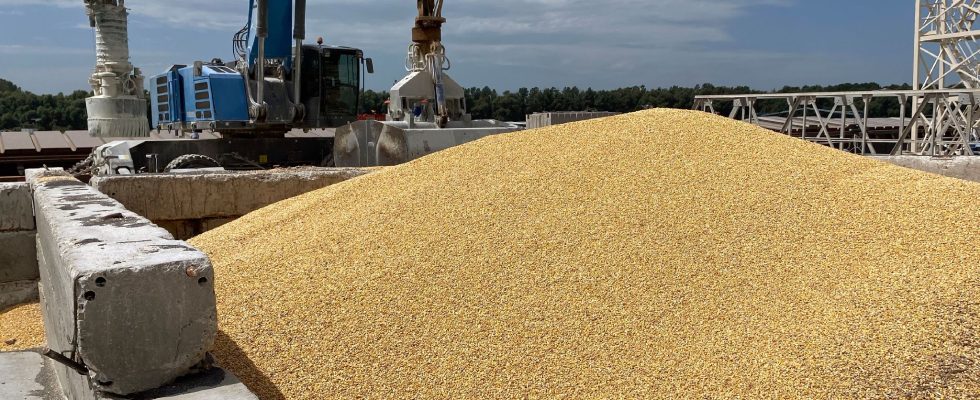The day after a “historic meeting” of European Union foreign ministers in Kiev, where Europe promised “lasting support” for its ally, Ukraine insisted on its need for help for its grain exports via the Black Sea.
Since Russia withdrew from the grain agreement in July, denouncing obstacles to its own exports due to Western sanctions, Moscow has notably threatened ships sailing in the Black Sea and bombed several Ukrainian ports. The grain issue has also caused a falling out between Ukraine and several Eastern European countries which have imposed restrictions to protect their farmers from falling prices, particularly Poland.
Ukraine calls on Europe to help secure a maritime corridor in the Black Sea
Among the topics of discussion at the meeting in Kiev this Monday of European Union foreign ministers, the issue of cereals was addressed in “very detail”, reported Dmytro Kouleba, Minister of Foreign Affairs of Ukraine, who praised the fact that “everyone is making an effort” on this subject.
Kiev has asked for help from its European partners to be able to export its cereals through the Black Sea, despite threats from Moscow and against a backdrop of conflict on this subject with border countries including Poland, whose minister was absent this Monday in Kiev. “A maritime corridor through which Ukrainian grain can be exported to the world without the involvement of Russia is possible”, nevertheless argued Dmytro Kouleba, believing that “if the European Union and Ukraine join forces to guarantee the security of this corridor [en mer Noire]it will be able to operate at full capacity.
Suspension of US aid to Ukraine would have “devastating” effect on kyiv
While the fighting does not stop at the Ukraine-Russia border, the most strategic front line appears to be in Washington right now. Indeed, since the agreement reached by Congress on a provisional budget setting aside aid for Ukraine in order to avoid a “shutdown” of the country, negotiations have been more than bitter between part of the Republican camp, close of Donald Trump and fiercely opposed to support for Ukraine, and the White House, which has repeatedly assured that military and humanitarian support for Kiev would last “as long as necessary”.
Several experts believe that a possible cessation of American aid to Ukraine could have a “devastating” effect for Ukraine. Mark Cancian, advisor to the Center for Strategic and International Studies think tank in Washington, told AFP that “the Ukrainian troops would be weakened and could even possibly collapse”, although he added that it would “surely be necessary wait several weeks before seeing effects on the battlefield”, the cessation of aid not having an immediate effect.
For his part, James Black, of the RAND Europe defense and security research center, insisted on the fact that the end of American aid would notably create a weakening of Ukrainian air defenses. “You can’t just […] replace one system with another if they operate in a slightly different way or aim to respond to different threats,” he explained, pointing out that “if you remove the American component, you inevitably diminish the effectiveness” of the entire interdependent system.
Moscow “devotes enormous resources” to dividing kyiv’s allies, accuses Ukraine
A few hours after predictions from the Kremlin on Western “weariness” which should “increase” with regard to support for Ukraine, kyiv did not fail to react. The head of Ukrainian diplomacy Dmytro Kouleba denounced the fact that Russia was devoting “enormous resources” to creating divisions among Ukraine’s allies. According to him, faced with these remarks, the meeting in Kiev this Monday of European Union foreign ministers represents precisely “more than a symbol”, but “a concrete tool to refute this so-called lack of unity” .
The head of diplomacy of the European Union Josep Borrell, also in Kiev this Monday, supported the words of his Ukrainian counterpart, estimating that “(Vladimir) Putin’s greatest hope is precisely that the West and the world tired of siding with Ukraine in this war”, sharing the observation that “Russia devotes enormous resources to it”. For its part, the White House responded by assuring that “Putin is wrong if he thinks he will last longer than us.”
The EBRD plans to double its investments in Ukraine
Doubling its financing in Ukraine when the time for reconstruction comes: this is the promise made by the president of the European Bank for Reconstruction and Development (EBRD), Odile Renaud-Basso. After a 30% contraction in Ukrainian gross domestic product (GDP) last year, “we now have stabilization. Outside of conflict zones and occupied territories, economic activity continues to function, banks to finance, companies have reorganized”, describes the president of the EBRD to AFP, who recalls that her institution has “substantially increased its financing” since the Russian invasion of Ukraine.
According to Odile Renaud-Basso, they went from “800 million to 1 billion euros per year” before the war, to “1.7 billion in 2022 and to date 1.2 billion euros in 2023 but we will go probably around 1.5 billion for the whole year, or even more,” she explains. “For the reconstruction phase, we should double our investments by (so as to reach) some 3 billion euros per year, with a focus on the private sector but also large infrastructures,” she finally adds.
Concerning the Russian economy, for which the EBRD has significantly raised its growth forecasts, Odile Renaud-Basso also recognized that it has resisted the war and Western sanctions better than expected.
